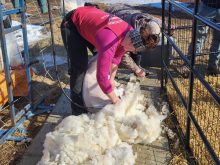EDMONTON – The Alberta government has given the livestock industry a shot of “tough love” with its announcement of a new livestock and meat strategy, said the spokesperson for Canada’s largest beef packing plant.
The Canadian beef industry has not recovered from being shut out of international markets after BSE. Mandatory age verification and a new vision may provide the change the livestock industry needs, said Robert Meijer, director of public affairs with Cargill.
“It allows us to firm up and shore up our position and allow us to recompete,” said Meijer.
Read Also

Charges laid after cattle theft
Saskatchewan RCMP lay two charges against a man after six cattle went missing.
He doesn’t know how Alberta’s new compulsory age verification policy will affect Cargill’s federally regulated packing plant that also accepts animals from other provinces without the new requirement. Cargill doesn’t want an increase in paperwork that adds cost but no value.
Meijer is also unclear how the new Alberta Livestock and Meat Agency will work.
The government will spend $56 million to establish the agency to act as a catalyst for a transition to a sustainable and competitive industry. It will also help co-ordinate funds and resources to ensure they are aligned with the new strategy.
“What we don’t want to see it become is a layer of bureaucracy and another political lever to be pulled for something to happen,” said Meijer.
Bryon Walton, chief executive officer of the Alberta Cattle Feeders Association, said his group supports the new livestock strategy.
The initiative provides immediate cash to producers and steers the livestock industry in the direction it needs to go for good market access, he said.
“It signals to me the government is standing up for producers here and wants to do something to move this industry along,” said Walton.
Jack de Boer, a southern Alberta feedlot operator and chair of the cattle feeders, said the initiative is a “bold step” that was needed to give the industry hope.
De Boer doesn’t know how the new livestock agency will work with existing agencies or commissions, but hopes it will be the key to keeping all livestock sectors working together.
“We don’t have one common voice. The agency will help pull everyone together,” he said.
Rod Scarlett, executive director of the Wild Rose Agricultural Producers, said the announcement is recognition that the red meat industry is in trouble, but he foresees problems, probably with the fact that money is connected to industry compliance.
“That’s a trend I wouldn’t like to see adopted.”
Scarlett said he doesn’t see the need for an additional livestock agency when the Alberta Beef Producers and Alberta Pork are already in place.
“I don’t see how a government appointed group would help when producer groups are already there.”
Herman Simons, chair of Alberta Pork, said the cash injection was key to the survival of his industry.
“Producers were dropping like flies and it’s not great for our industry. We’re at a critical point and we may lose the critical mass for our industry to stay in place.”
Simons said the pork industry has already identified promotion and market development as keys to the survival of their industry. The government’s announcement means everyone will be working together.
Other parts of the Alberta Livestock and Meat Strategy will:
- Expand animal health surveillance and diagnostic capabilities.
- Develop an Alberta Livestock Information System that will record age verification, premises identification, vaccination, animal welfare practices and information about rearing and breeding.
- Develop the Alberta Ingenuity Centre for Livestock Genomics Technology.
- Provide certification for hormone-free, range fed, grass fed and naturally raised products.
- Review all government marketing grants and funds to ensure accountability and alignment of goals.
- Support existing carbon offset programs.
- Establish an Alberta Feed Grain Centre of Excellence.
- Evaluate the feasibility of establishing an unsubsidized cattle price insurance program.
















